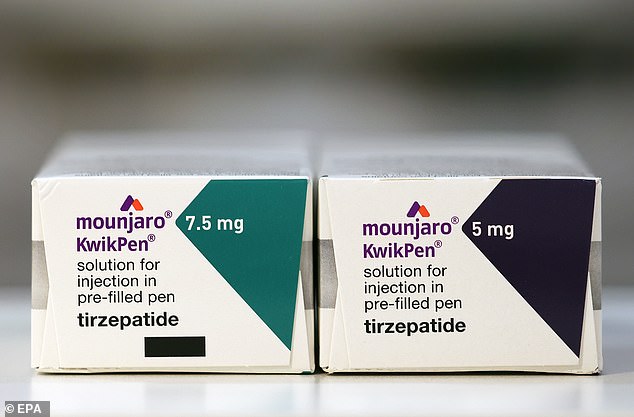[ad_1]
Mounjaro users have been given a stern warning over the potentially dangerous side effects of the drug ahead of the August bank holiday.
The drug, which is estimated to be taken by up to 750,000 people nationwide, is one of the country’s most popular weight loss and diabetes medications.
But while it has been credited with helping people lose 20 per cent of their body weight, it is not all good news for users.
That is because those taking the medication could be hit with unexpected alcohol related side effects, according to SheMed, a UK-based female-focused HealthTech company.
While some who use Mounjaro might believe they are getting drunker quicker because they have lost weight, they may in fact be suffering from low blood sugar from taking the injections, Rachael Joy, SheMed’s Chief Clinical Officer has warned.
‘If you feel shaky, sweaty, light-headed, confused, or your vision goes blurry, don’t simply put it down to the alcohol,’ she said.
‘It is worth considering if it could be hypoglycaemia. It’s important to listen to your body while taking GLP-1 medication and respond accordingly.’
Hypoglycaemia is a condition where blood sugar levels drop too low. It can cause a range of symptoms from hunger to more severe effects such as seizures or loss of consciousness.

Mounjaro users have been given a stern warning over potentially dangerous side effects of the drug ahead of the August bank holiday

This map highlights the areas most blighted by obesity. Up to 750,000 people are estimated to be using Mounjaro, which is one of the country’s most popular weight loss and diabetes medications
Those taking Mounjaro can often be prone to low blood sugars. The drug stimulates insulin secretion, which can cause blood sugar levels to drop further.
‘You may feel less inclined to drink alcohol, as some studies have reported that Mounjaro can blunt the brain’s reward response,’ Ms Joy said.
‘It also slows digestion, whilst alcohol can throw your blood sugar off balance. Put the two together and even a small amount can affect you more than expected.’
Mounjaro is a prescription-only treatment for weight loss and type 2 diabetes.
The NHS recommends the use of it to management obesity for certain patients.
It is sold under the brand name Mounjaro for diabetes treatment and Zepbound for weight loss treatment.
Users inject themselves once a week and they feel fuller for longer.
Meanwhile, people paying privately for Mounjaro in the UK face a rise in the cost of treatment after manufacturer Eli Lilly said it would raise the price by as much as 170 per cent earlier this month.

Social media users are already claiming to have sourced retatrutide, another weight loss drug, on the black market after Mounjaro’s impending price rise
It means a month’s supply could rise from £122 to £330.
Eli Lilly said it was being sold in the UK at a price ‘significantly below’ what was charged in other European countries
The price rise has sparked panic with slimmers now rushing to get their hands on a powerful new drug dubbed the ‘Godzilla’ of weight loss jabs.
Early trials of the drug, retatrutide, suggest it can help people shed a quarter of their body weight in under a year – almost twice as effective as Ozempic.
Unlike other slimming injections, the jab, also manufactured by Eli Lilly, not only suppresses appetite but also speeds up metabolism.
Because it targets three hormones involved in eating and weight regulation, it has been nicknamed ‘triple G’.
The once-weekly injection is still in clinical trials, with phase three results not expected until 2026.
Yet social media users are already claiming to have sourced the drug on the black market, boasting of losing more than three stone in just months.
[ad_2]
This article was originally published by a www.dailymail.co.uk . Read the Original article here. .

